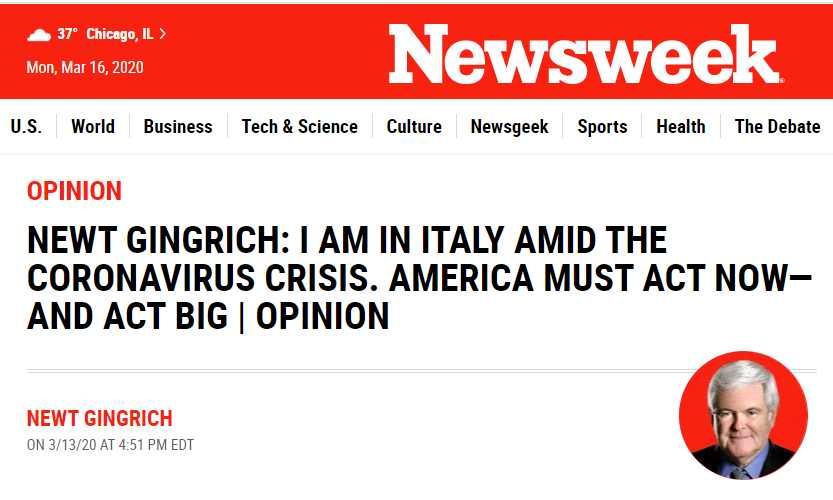Former House Speaker Newt Gingrich is skeptical of climate change, supports teaching creationism in public schools, and opposes stem cell research. That’s exactly why he might be particularly effective in convincing Republican supporters that the Covid-19 pandemic is a real danger.

For careful observers of American politics, Gingrich’s comments might seem somewhat out of place. While Gingrich passionately fought for increased federal science funding throughout his career in public life, he has regularly toed the Republican party line on climate change skepticism, support for teaching creationism in public schools, and opposition to federal funding for stem cell research.
It may, therefore, seem counterintuitive to suggest that Gingrich’s comments might help convince Republicans—who tend to be less likely than Democrats and Independents to express concern about coronavirus and take corresponding action—to view coronavirus threats seriously. However, Gingrich’s conflictual relationship with science, and his prominence in the Republican Party, may be precisely why his op-ed could change minds on the ideological right.
Psychologically, people tend to be more likely to view messages (like Gingrich’s op-ed) as credible when they come from a trusted source. Consequently, when people are presented with information from like-minded sources—who they tend to like and trust more than non-like-minded sources—they are more likely to accept that information as accurate; even if that information runs contrary to their views.
Several studies in the fields of science communication and political science demonstrate this point. For example, one study found that while Republicans (in the population) were more likely to believe rumors about the creation of “death panels” in the Affordable Care Act, they were less likely to accept this misinformation as fact if encouraged not to by like-minded Republican elites.
Related studies have also found that when Republican politicians and other groups conservatives trust (e.g., military service members and elites) suggest that climate change is both real and human-caused, Republicans in the population—who tend to be more resistant to scientific consensus on the reality and severity of climate change—are less likely to embrace climate skepticism.
This line of research suggests that, when Republican elites like Newt Gingrich sound the alarm on the seriousness of coronavirus, Republicans might listen. Consequently, other household names in the GOP like Ted Cruz—who recently took to social media to urge Americans to view the coronavirus threat seriously—could help close the partisan gap in coronavirus concern.
To do so, however, more GOP figures must be willing to express concern about coronavirus and to share their views as widely as possible, beyond social media.
Mark Motta is an Assistant Professor of Political Science (American Politics, Research Methods) at Oklahoma State University in Stillwater, OK.
The ProMarket blog is dedicated to discussing how competition tends to be subverted by special interests. The posts represent the opinions of their writers, not necessarily those of the University of Chicago, the Booth School of Business, or its faculty. For more information, please visit ProMarket Blog Policy.






